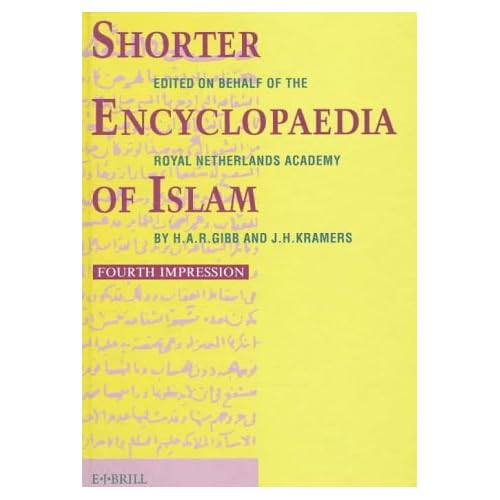Do livro recomendado, Shorter Encyclopedia of Islam, faz referência à entrada "Jihad", que seguidamente cita:
Consider the Shorter Encyclopedia of Islam entry on jihad (spelled “djihad”)—arguably the most important single subject today’s students must grasp about Islam. The concise discussion of jihad was written by Duncan B. MacDonald (1863-1933), a very sympathetic scholar of Islam, renowned for his seminal analyses on the development of Muslim theology and jurisprudence. Here are MacDonald’s key observations about the nature and conduct of jihad, which he defines with doctrinal and historical accuracy, as “holy war”:
«[H]oly war. The spread of Islam by arms is a religious duty upon Muslims in general…This position was reached gradually but quickly. In the Meccan Suras [chapters] of the Koran patience under attack is taught; no other attitude was possible. But at Medina the right to repel attack appears, and gradually it became a prescribed duty to fight against and subdue the hostile Meccans. Whether Muhammad himself recognized that his position implied steady and unprovoked war against the unbelieving world until it was subdued to Islam may be in doubt. Traditions [especially the hadith, the canonical collections of Muhammad’s words and deeds recorded by his most pious Muslim companions] are explicit on the point; but the Koranic passages speak always of the unbelievers who are to be subdued as dangerous or faithless. Still, the story of his writing to the powers around him shows that such a universal position was implicit in his mind, and it certainly developed after his death, when the Muslim armies advanced out of Arabia. It is now a fard ala l-kifaya, a duty in general on all male, free, adult Muslims, sane in mind and body and having means enough to reach the Muslim army, yet not a duty necessarily incumbent on every individual but sufficiently performed when done by a certain number. So it must continue to be done until the whole world is under the rule of Islam…
Mais adiante, Bostom faz uma nova citação, da autoria de outro académico ocidental do islão, Maxime Rodinson, a qual escrevia, em 1974:The people against whom the jihad is directed must first be invited to embrace Islam. On refusal they have another choice. They may submit to Muslim rule, become dhimmis and pay jizya and kharadj [specific taxes imposed on the vanquished non-Muslims—the former, in lieu of being slain] or fight. In the first case, their lives, families and property are assured to them, but they have a definitely inferior status, with no technical citizenship, and a standing only as protected wards. If they fight, they and their families may be enslaved and all their property seized as booty, four-fifths of which goes to the conquering army. If they embrace Islam…they become part of the Muslim community with all its rights and duties. Apostates must be put to death. But if a Muslim country is invaded by unbelievers, the Imam [Muslim sovereign] may issue a general summons calling all Muslims there to arms, and as the danger grows so may the width of the summons until the whole Muslim world is involved. A Muslim who dies fighting in the Path of Allah (fi sabil Allah) is a martyr (shahid) and is assured of Paradise and of peculiar privileges there [a genteel reference to the willing virgins awaiting jihad martyrs]. Such a death was in the early generations, regarded as the peculiar crown of a pious life. It is still, on occasions, a strong incitement…
The anti-colonial left…often goes so far as to sanctify Islam and the contemporary ideologies of the Muslim world… Understanding has given away to apologetics pure and simple.Como dizemos aqui na casa: nada disto é novo.
Aprendamos com os antigos as lições que eles aprenderam pela própria experiência.
Addendum: Bostom informa que foi publicada uma reedição desta enciclopédia com outro nome: Concise Encyclopedia of Islam.


Sem comentários:
Enviar um comentário